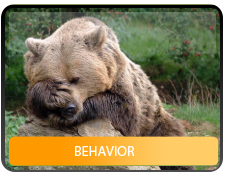Behavior
The brown bear is one of the most intelligent mammals. Its ability for spatial orientation is superior to that of a human. It has extraordinarily good memory and is resourceful and inventive. A bear remembers every single source of food within its huge range. It skillfully uses twigs, sticks and other objects to build a lair, defend itself or obtain food. Hundreds of kilometers of forest trail may be roamed before a bear finds a quiet and secluded corner of the woods where it will not have to put up with howling winds and lashing rain or snow.
Bears have an uncanny ability to accumulate life experience. They learn lessons from their encounters with humans: the bark and the painful bites of shepherd dogs, a hunter’s stinging pellets, the numbing pain and stomach cramps as a result of ingested poison, all leave indelible imprints in their minds that will stay with them forever.
The brown bear has no rival in physical strength in the wild of Bulgaria; therefore it lives alone, pointedly avoiding its own kind and potential rivals. Clashes with other predators and large animals are rare and mostly in situations of competition for prey or territory.
The bear likes peace and quiet. Playful and friendly at a tender age, young cubs gradually become more aloof and wary. After the third year each one retreats within its own range and starts a relatively solitary life. The female teaches her cubs survival skills for almost two years: she shows them which grasses and berries are edible, where the good raspberry bushes are, when the bilberries are ripe and in which thickets and caves to seek shelter.
There is abundant evidence that bears are capable of emotion. After a female is shot before her cubs’ eyes, they cry and suffer for weeks. If a mother loses her cub, the intensity of her grief is human-like.
| Video: |




















